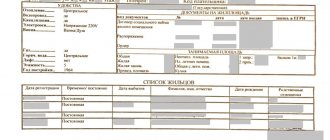Read on our website about how to discharge a minor from a privatized and municipal apartment, what documents are needed to formalize the removal of a minor from registration at the place of residence.
Features of removing a minor from an apartment
Children under the age of majority are under special protection of the state. Of course, since the child is not legally competent, all responsible decisions for him are made by his parents or guardians. However, any choice of legal representatives should not contradict the norms of legal acts.
So, for example, unlike an adult capable person, a child cannot be discharged “to nowhere.” The process of deregistration of a minor includes other rules.
- A citizen who has not reached the age of majority cannot be discharged or registered somewhere without the participation of parents or guardians.
- A minor may be the owner of either part of the premises or the entire area. No transaction or procedure regarding children's rights (including the right to residence) can be carried out without the permission of the guardianship and trusteeship authorities.
- In case of divorce, the consent of both parents or guardians will be required for discharge.
- If a minor does not live in the apartment, but is registered in it, then he can be discharged only by decision of the judicial authorities.
- The right to use residential premises remains with the child, even if one of the legal representatives has been deprived of parental rights.
- To discharge a minor, it is necessary to provide him with a new place of residence.
It is legally stipulated that the new place of residence should not be worse in terms of characteristics than the previous one. Let's take a closer look at the features of removing children from an apartment.
Is it possible to expel a minor child owner from the apartment?
It is possible to discharge a child when he is the owner of the entire apartment or part of it. In this case, you should start by obtaining permission from the guardianship and trusteeship authorities.
To contact the institution, you must collect a package of documentation:
- a certificate of persons registered in the apartment (at the territorial Federal Migration Service);
- an extract from the Unified State Register or a certificate of ownership of the apartment;
- technical documentation from the BTI for the existing and new apartments;
- general civil passports of legal representatives;
- birth certificate or passport of the minor;
- statement.
Provided that the full package of documents is provided, the application will be considered within three weeks. Discharge is possible only after agreement with the guardianship authorities.
To do this, you need to contact the Federal Migration Service with the following documents:
- permission from guardianship authorities;
- application (if the child has a passport, writes it independently);
- parents' general passports;
- birth certificate;
- extract from the Unified State Register or certificate of ownership.
Deregistration occurs within three working days. After this, it is necessary to register the child at the new residence address. To do this, you need to contact the Federal Migration Service at the location of the new housing.
In addition to the above documents, you will need to provide a departure sheet from the previous place of registration and fill out an arrival address sheet. The maximum registration period will also be three days.
Discharge or registration of children can only be carried out jointly with their parents. Therefore, deregistration may require their written consent. This is necessary if the minor lives separately.
Instructions. Method number 1 - write out through registration in a new place
The child does not have to be discharged. It is enough to register him at the new place of residence and he will be automatically discharged from there within 3 days - clause 31 of the Decree of the Government of the Russian Federation of July 17, 1995 N 713. Two applications must be submitted at the passport office at the new address.
Choose your situation. How to register a child: 1) through the passport office, MFC or Ministry of Internal Affairs; 2) through State Services; 3) to a municipal apartment (both methods are described).
Other articles
Are you going to sell your apartment? Follow the link to find a list of documents.
How to remove children from an apartment when selling?
A newly acquired real estate property cannot be less than what was sold. Otherwise, the guardianship and trusteeship authorities may not give consent to re-registration, and the transaction under the purchase and sale agreement will be declared invalid, since the rights of the children are violated.
After the permission for the transaction and the extract are in the hands of the parents, the algorithm of actions is as follows:
- Registration of a transaction for the sale of an old apartment and the acquisition of a new one in Rosreestr or the MFC.
- Obtaining an extract from the Unified State Register of Real Estate confirming ownership of a new apartment.
- Carrying out deregistration at the old place of residence.
- Registration at the address of the new home.
If the minor was not the owner of the sold apartment, the procedure will remain virtually unchanged. The only change is that you do not need to obtain the consent of the board of trustees.
It should be clarified that one of the parents can expel children from the apartment only if they are registered with the second legal representative.
Method number 2 – write out “to nowhere”
If there is no place for the child to be registered yet, it’s okay - they will be discharged anyway. The following describes two ways to submit an application - to the passport office/MFC (below) or through State Services (to make an appointment at the Ministry of Internal Affairs).
Through the passport office or MFC
Both organizations only accept documents, transfer them to the district Ministry of Internal Affairs and receive them back after completion of the service - clause 23 of Order of the Ministry of Internal Affairs N 984 and the list in the Decree of the Government of the Russian Federation of July 17, 1995 N 713.
First, read the pros and cons of each organization, because the instructions are the same depending on where you apply:
- MFC "My Documents".
Pros - 1) They usually discharge you faster. The maximum period is 3 working days from the date of application. MFCs send documents to the Ministry of Internal Affairs electronically through the system of interdepartmental interaction (SMEV) - clause 38 of Order of the Ministry of Internal Affairs N 984. 2) Usually employees fill out applications themselves. 3) You can make an appointment by phone or through the website. 4) They do not charge money for sending documents.Disadvantages - 1) Not all MFC branches accept such applications. First, call your local MFC and clarify this issue. Addresses and telephone numbers are easy to find on the Internet. 2) There may be queues because the MFC provides many other services.
- Passport office of the Management Company (housing office, housing department, homeowners' association, etc.).
One plus is that most often there are no queues. Cons: 1) The registration period is longer - up to 6 days. Passport officers transfer documents to the Ministry of Internal Affairs in paper form because they are not connected to the system of interdepartmental interaction - clauses 36 and 93.4 of Order of the Ministry of Internal Affairs N 984. 2) Sometimes they can charge a small amount of 30-100 rubles for transferring documents. In most management companies, this service is already included in the cost of home maintenance. The discharge procedure itself is free - clause 62 of Order of the Ministry of Internal Affairs N 984.
Once you have decided where to go, read the instructions. It is general:
- We go to the passport office or MFC.
Child under 14 years old. His presence is not required. Both parents/guardian must come instead - Art. 28 Civil Code of the Russian Federation.Any of the parents (if they are registered together) or the one with whom the child is currently registered: 1) Submits originals and copies of his passport and the child’s birth certificate - clause 54 of Order of the Ministry of Internal Affairs N 984. You will also need a certificate of registration of the child at the place of residence at form No. 8. It indicates that he is indeed registered at such and such an address. It is taken from the passport office or MFC. 3) Fills out and signs an application to remove the child from registration at the place of residence - or a sample. Be sure to indicate the address of the child’s future residence. What is required from the second one is written below.
The employee will immediately return the child’s passports and birth certificate, but will take away their copies, as well as the application and certificate in Form No. 8.
If the child is over 14 years old . He must come with both parents/guardian - Art. 26 Civil Code of the Russian Federation. Even if the child is registered separately from them (this happens). The child fills out and signs an application for his discharge - or a sample. It indicates the place of future residence of the child. Additionally, the application must be signed by one of the parents (if registered together) or the parent with whom the child is currently registered.
The employee will take the application, the child’s passport and a copy of the parent’s passport (the original will be returned immediately).
The second parent provides his passport and writes a free form consent for the child’s discharge - or a sample. In it, he indicates the future place of residence of the child - the same as in the application for discharge. The first parent can submit a notarized consent of the second parent if he cannot be present (his passport is not required). If the second parent refuses to give consent or is not contacted, the first parent writes a simple statement stating the reasons for not providing consent. Then the head of the Ministry of Internal Affairs will decide whether to discharge the child or not. In case of refusal, the parent will have to first determine the child’s place of residence with him through the court - clause 3 of Art. 65 RF IC.
- The documents will be sent to the district Ministry of Internal Affairs .
Documents from the MFC are sent to the Ministry of Internal Affairs in electronic form, and from the passport office in paper form. An employee of the Ministry of Internal Affairs will conduct an inspection. If everything is filled out correctly, then he will enter the data about the child’s deregistration into the Mir system and send the documents back. - You can pick up your documents on the appointed day .
When a child under 14 years of age is discharged, they will return a certificate of registration at the child’s place of residence in Form No. 8, but with a stamp confirming his discharge. If the child is over 14 years old, his passport will be returned with a discharge stamp - clause 123.3 of Order of the Ministry of Internal Affairs N 984. When contacting the MFC, the stamps are placed by their employee - clause 121 of Order N 984.
Other articles
How to obtain permission from the guardianship and trusteeship authorities to sell an apartment if there are minor owners
Method No. 2 - Through State Services (make an appointment at the Ministry of Internal Affairs)
I wrote above that when only a child is discharged, State Services will only help you make an appointment with the Ministry of Internal Affairs. For the procedure, you should use the account of any of the child’s parents/guardians. You can use the website or mobile application of the State Services. Feeding instructions do not differ from device to device. I used the website because it is easier and clearer to fill out the information.
- Follow this link, go to your personal account and click “Start”.
- Select “Registration at place of residence”, then “Stop registration”.
- We confirm the phone and email, then select the desired district Ministry of Internal Affairs at the child’s registration address. For this indicate the desired city or region and click “Correct”.
Using the map or search, we find the Ministry of Internal Affairs we need and click “Select” on the right .
- Click “Make an appointment”, then in the calendar select date and time. Click on the “Make an Appointment” button again.
- Now click on the “Add to your personal account” button. We go to the message “Registration confirmed”. From below there will be a pin code, which should be remembered.
- We visit the migration department of the Ministry of Internal Affairs at the appointed time.
Child under 14 years of age. Both parents/guardian must come instead - Art. 28 Civil Code of the Russian Federation. The parent who submitted the electronic application: 1) Provides the original and a copy of his passport and the child’s birth certificate + the original certificate of registration of the child at the place of residence in Form No. 8. It can be obtained at the passport office or MFC. 2) Signs the previously submitted application. If there was any inaccuracy in it, you will have to compile it again on the provided form - or a sample. I wrote about the second parent below.An employee of the Ministry of Internal Affairs: 1) Takes the application, a copy of the representative’s passport and a copy of the child’s birth certificate. The originals will be returned. 2) Immediately put a stamp on the child’s discharge on the registration certificate and return it - clauses 118.3 and 123.3 of Order of the Ministry of Internal Affairs N 984.
Child over 14 years old. He must come with both parents/guardian - art. 26 Civil Code of the Russian Federation. The child signs the application + the signature is put by the parent who submitted it through the State Services. If there was any error in the application, the child fills out a new one on the provided form - or a sample. It is also signed by the parent with whom the child is registered. Or any of them, if they are spelled out together.
An employee of the Ministry of Internal Affairs: 1) Takes the application and a copy of the parent’s passport. 2) Immediately put a stamp on the discharge in the child’s passport and return it - clause 37 of Order of the Ministry of Internal Affairs N 984.
The second parent provides the original and a copy of his passport and writes consent for the child’s discharge in free form - or a sample. Indicates the same future address of residence of the child as in the application for discharge. If he cannot be present, the first parent can submit his notarized consent (no passport required). If the second parent does not consent or is not contacted, the first parent writes a simple statement stating the reasons for not providing consent. And the head of the Ministry of Internal Affairs will decide whether to discharge the child. In case of refusal, the parent will have to first determine the child’s place of residence with him through the court - clause 3 of Art. 65 RF IC.
Method number 3 - Without his consent
If the child’s parents refuse to discharge him, ignore this requirement, or there is no contact with them, they will have to file a lawsuit. There is no other way out - either voluntary discharge, or you need to provide a positive court decision. Clause 31 of Government Decree No. 713 of July 17, 1995 - “Removal of a citizen from registration at the place of residence is carried out by registration authorities in the event of: a) change of place of residence - on the basis of a citizen’s application for registration at a new place of residence or an application for deregistration registration at the place of residence; f) eviction from an occupied residential premises or recognition as having lost the right to use residential premises - on the basis of a court decision that has entered into legal force.”
Please read these instructions carefully. They were written by a lawyer specializing in the following court cases: 1) How can owners discharge a child without his or her consent. 2) Discharge the child from the municipal apartment.
Other articles
How to find out how many times, to whom and when an apartment was sold - online method.
If you have questions, you can consult for free. To do this, you can use the form below, the online consultant window and telephone numbers (24 hours a day, seven days a week): 8 Moscow and region; 8 St. Petersburg and region; all regions of the Russian Federation.
Is it possible to discharge a child from public housing?
Extract from municipal housing is practically no different from the procedure described above. The basic conditions of this procedure are similar - the minor will be registered in an apartment whose characteristics are no worse than the previous place of residence, with at least one of the parents.
The algorithm for visiting institutions will be as follows:
- Passport Office. Here you need to obtain a certificate confirming the actual residence of the children with their parents. You need to take identification documents and a social tenancy agreement with you.
- Accounting of the passport office. Here you need to obtain a certificate of the status of personal accounts to confirm the absence of debt on payments for municipal housing.
- Guardianship authority. Employees are required to obtain consent for discharge. You must come with the following papers: a social tenancy agreement, passports and birth certificate, a certificate of persons registered in the apartment, a personal account, a technical passport and all documents for the new living space.
- Passport office at the old place of residence. If the consent of the board of trustees is received, the student is discharged and receives a departure certificate.
- Passport office of the new place of residence. For registration, documents for the apartment and a departure slip are provided.
Each authority must fill out an application. Registration and discharge of a person over 14 years of age is carried out on the basis of an application drawn up by him personally.
Where is the discharge carried out and what is the time frame?
Registration of registration of citizens, including minors, is carried out by the following organizations: departments of the Federal Migration Service, passport offices at HOAs, housing departments, MFC .
Upon reaching 14 years of age, a citizen submits an application and draws up a departure form at the Federal Migration Service or MFC independently.
Each procedure included in the general actions to remove a child from registration has its own deadlines established by law .
Guardianship authorities review submitted documents from 14 to 20 days , the Federal Migration Service - 7 days .
After deregistration, you must register the child within three days, providing information to the guardianship authorities.
How to discharge a child from an apartment if he does not live there?
In order to discharge an incompetent citizen from housing in which he does not actually live, it will also not be possible without visiting the board of trustees. Employees of the institution will need to prove that the place where the children actually live is no worse in terms of characteristics than the one in which it is registered.
It will not be possible to discharge someone anywhere without the consent of both parents or guardians. This will also be impossible if the guardianship and trusteeship authorities do not consider the place of actual residence acceptable for the child in comparison with the apartment at the registration address.
Is it possible to remove a child from an apartment without the consent of the mother or father?
Consent for discharge from parents or guardians is required if they live separately. When, during a divorce, the father and mother cannot agree with whom the minor will live, legal difficulties arise with re-registration.
You can discharge children from the apartment without the consent of the mother or father only in the following cases:
- If there is no information about the whereabouts of the minor's second legal representative.
- If living together between parents is impossible due to a possible risk to the life or health of a minor.
- The father or mother has been deprived of parental rights.
- One of the parents is in prison.
- The parent has debts to pay for housing and communal services.
In other situations, the decision on the place of residence of children is made by the judicial authorities. Let's look at a few examples.
The girl has been living with a man for several years. During their stay, they had a son, who was registered in the man’s apartment. The owner of the property is the uncle of the child's father. The boy does not live at his place of registration, so his uncle decides to discharge the child. In this case, the minor cannot be discharged without the consent of the mother.
Several adults and two children are registered in the apartment under a social lease agreement. The main tenant is the father of the children. Mom was discharged from municipal housing by decision of the judicial authorities and currently has no permanent place of registration. Children can be discharged without her consent only through the court. If the father regularly pays the rent, then even the court will not have grounds to discharge the minors.
Important information when discharging a child
- The procedure does NOT require permission from the guardianship authorities - more details. I don’t understand why other articles on the Internet write the opposite opinion. They are wrong. Guardianship permission must be obtained only when making transactions with a minor’s real estate - sale, rental, collateral, etc. (Clause 1, Article 21 of the Federal Law of April 24, 2008 N 48-FZ). Checking out of housing is not a transaction.
- I will write separately about State Services. If you only need to discharge a child and he is under 14 years old, then you will not be able to submit an application through State Services. If you don’t believe me, then go to the services page → log into your personal account → start → stop registering → children only. A message will appear informing you that you need to visit the Ministry of Internal Affairs.
You can submit an application through State Services in two cases: 1) A child under 14 years of age is discharged together with a parent. 2) A child over 14 years of age is discharged. Then he must have a personal account in the State Services, from where he will submit an application on his own behalf.In this situation, I advise you to register in advance at the Ministry of Internal Affairs through the portal, otherwise you will end up in a queue - instructions. Or submit documents and an application to the passport office or MFC - instructions.
- The child can be discharged “to nowhere” , i.e. You don’t have to register it anywhere right away—more details. In the application for discharge, it is required to indicate the address of the child’s future residence. Nothing prevents you from indicating any address - another parent, relative, etc. The child will not be registered at this address, no one will require additional certificates or check anything. Passport officers have no such obligation.
- The discharge will require the consent and presence of both parents , because they have equal rights and responsibilities in relation to the child - clause 1 of Art.
61 IC RF. Even if they are divorced and live/registered separately - clause 3 of Art. 65 RF IC. If one parent is unable to attend, a notarized copy will be required. I will indicate all the details below in each method. Speaking about parents, I mean those who are indicated on the child’s birth certificate as father or mother and are not deprived of parental rights - Art. 47 and art. 71 RF IC, art. 3 and art. 23 of the Federal Law of November 15, 1997 N 143-FZ. The same rules are established for adoptive parents, foster parents and guardians of a child who have supporting documents in their hands. - It doesn’t matter whether there are debts on utility bills - details. There is no prohibition on discharging someone if they have debts. Don't forget that debts won't go away. Parents of a discharged child must still pay for them. The above article at the link also talks about this.
- If a child is discharged from municipal housing, he loses the right to privatize it - details.
- Since 2021, instead of the Federal Migration Service, the migration departments of the regional Ministry of Internal Affairs (Ministry of Internal Affairs) - Order of the Ministry of Internal Affairs dated December 31, 2017 N 984 - are responsible for extracting and registering citizens (registration records). The Ministry of Internal Affairs accepts applications from citizens directly or through intermediaries - MFC, passport office or State Services (clause 23 Order of the Ministry of Internal Affairs N 984 and the list in the Decree of the Government of the Russian Federation of July 17, 1995 N 713).
According to paragraph 90 of Order No. 984, you are allowed to come to the Ministry of Internal Affairs without an appointment or make an appointment by phone, but it is better not to do this. Firstly, when visiting without an appointment, it is easy to stumble upon long queues. Moreover, more of those who signed up in advance. Secondly, the phone is rarely answered. Therefore, it is better to submit a paper application through intermediaries to the passport office/MFC, and through State Services you can submit an electronic application or make an appointment in advance at the Ministry of Internal Affairs. All methods are described below.
A small digression - if you need a free consultation, write online to the lawyer on the right or call (24 hours a day, 7 days a week) (Moscow and the region); (St. Petersburg and region); 8 (800) 350-24-83 (all regions of the Russian Federation).
Is it possible to discharge a child to nowhere?
In the general situation, discharge to nowhere is impossible by law. An exception may be the case when children are the owners or co-owners of the property. When selling, if you are just planning to purchase a new home, but the transaction has not yet been completed, it is allowed to deregister a minor without immediate registration to a different address.
In this case, it is necessary to transfer the proceeds for the children’s share of property to their personal account. Such a procedure must be agreed upon with the guardianship and trusteeship authorities.
Moreover, a minor is discharged only together with one of the parents. If one of them is deregistered at the place of residence, then the second will not be able to do so. Guardianship consent is not required for the release of one of the parents.
Legislative regulation of the issue of registration
Russian legislation has currently replaced the term “propiska” with the wording “registration at the place of residence.”
But the word “discharge” is still used in the vocabulary of citizens. Regarding registration, the law establishes the following:
- registration of children where the mother or father lives - the issue is under the control of the guardianship authorities;
- Art. The Civil Code determines the place of residence for a child under 14 years of age or guardian citizens where the parent/parents, adoptive parents, guardians live;
- When registering parents in different places, you can register a minor at one of the addresses.
Important! According to Article 70 of the Housing Code, registration of persons under 18 years of age does not require the consent of citizens living at this address.
Article 20 of the Civil Code of the Russian Federation “Place of residence of a citizen of the Civil Code”
Is it possible to discharge a minor child by court?
If it is not possible to resolve the issue of discharge amicably, then you can try to resolve the situation through the court. The statement of claim states the requirement to terminate the minor’s right to use residential premises.
The plaintiff may be the owner of the property or another interested party. Since the actual defendant is incompetent, his parents or guardians will represent his interests.
The claim must be filed at the court branch at the address of the real estate. If a citizen has reached the age of 14, then his presence at the trial will be required.
In order to competently, from a legal point of view, draw up a statement of claim, we recommend contacting a professional lawyer. The specialist will also be able to advise on other issues related to the registration of children. You will need to pay a state fee of 300 rubles.
If the court makes a positive decision, it will enter into legal force in a month. In the future, there will be either a voluntary discharge of the minor, or a forced discharge - with the help of bailiffs.









